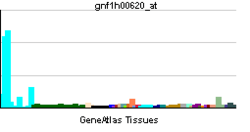PRAM1
| PRAM1 | ||||||
|---|---|---|---|---|---|---|
| Identifiers | ||||||
| Aliases | PRAM1, PML-RAR, PRAM-1, PML-RARA regulated adaptor molecule 1 | |||||
| External IDs | MGI: 3576625 HomoloGene: 12963 GeneCards: PRAM1 | |||||
| RNA expression pattern | ||||||
 | ||||||
| More reference expression data | ||||||
| Orthologs | ||||||
| Species | Human | Mouse | ||||
| Entrez | ||||||
| Ensembl | ||||||
| UniProt | ||||||
| RefSeq (mRNA) | ||||||
| RefSeq (protein) | ||||||
| Location (UCSC) | Chr 19: 8.49 – 8.5 Mb | Chr 17: 33.64 – 33.65 Mb | ||||
| PubMed search | [1] | [2] | ||||
| Wikidata | ||||||
| View/Edit Human | View/Edit Mouse |
PML-RARA-regulated adapter molecule 1 is a protein that in humans is encoded by the PRAM1 gene.[3][4][5]
Function
The protein encoded by this gene is similar to FYN binding protein (FYB/SLAP-130), which is an adaptor protein involved in T cell receptor mediated signaling. This gene is expressed and regulated during normal myelopoiesis. The expression of this gene is induced by retinoic acid and is inhibited by the expression of PML-RARalpha, a fusion protein of promyelocytic leukemia (PML) and the retinoic acid receptor-alpha (RARalpha).[5]
Interactions
PRAM1 has been shown to interact with TRIM27.[6]
References
- ↑ "Human PubMed Reference:".
- ↑ "Mouse PubMed Reference:".
- ↑ Moog-Lutz C, Peterson EJ, Lutz PG, Eliason S, Cavé-Riant F, Singer A, Di Gioia Y, Dmowski S, Kamens J, Cayre YE, Koretzky G (Jun 2001). "PRAM-1 is a novel adaptor protein regulated by retinoic acid (RA) and promyelocytic leukemia (PML)-RA receptor alpha in acute promyelocytic leukemia cells". J Biol Chem. 276 (25): 22375–81. doi:10.1074/jbc.M011683200. PMID 11301322.
- ↑ Clemens RA, Newbrough SA, Chung EY, Gheith S, Singer AL, Koretzky GA, Peterson EJ (Dec 2004). "PRAM-1 Is Required for Optimal Integrin-Dependent Neutrophil Function". Mol Cell Biol. 24 (24): 10923–32. doi:10.1128/MCB.24.24.10923-10932.2004. PMC 533979
 . PMID 15572693.
. PMID 15572693. - 1 2 "Entrez Gene: PRAM1 PML-RARA regulated adaptor molecule 1".
- ↑ Cao T, Duprez E, Borden KL, Freemont PS, Etkin LD (May 1998). "Ret finger protein is a normal component of PML nuclear bodies and interacts directly with PML". J. Cell. Sci. 111 (10): 1319–29. PMID 9570750.
Further reading
- Boddy MN, Howe K, Etkin LD, Solomon E, Freemont PS (1996). "PIC 1, a novel ubiquitin-like protein which interacts with the PML component of a multiprotein complex that is disrupted in acute promyelocytic leukaemia". Oncogene. 13 (5): 971–82. PMID 8806687.
- Cao T, Duprez E, Borden KL, Freemont PS, Etkin LD (1998). "Ret finger protein is a normal component of PML nuclear bodies and interacts directly with PML". J. Cell. Sci. 111 (10): 1319–29. PMID 9570750.
- Khan MM, Nomura T, Kim H, Kaul SC, Wadhwa R, Shinagawa T, Ichikawa-Iwata E, Zhong S, Pandolfi PP, Ishii S (2001). "Role of PML and PML-RARalpha in Mad-mediated transcriptional repression". Mol. Cell. 7 (6): 1233–43. doi:10.1016/S1097-2765(01)00257-X. PMID 11430826.
- Denis FM, Benecke A, Di Gioia Y, Touw IP, Cayre YE, Lutz PG (2005). "PRAM-1 potentiates arsenic trioxide-induced JNK activation". J. Biol. Chem. 280 (10): 9043–8. doi:10.1074/jbc.M413564200. PMID 15637062.
- Rual JF, Venkatesan K, Hao T, Hirozane-Kishikawa T, Dricot A, Li N, Berriz GF, Gibbons FD, Dreze M, Ayivi-Guedehoussou N, Klitgord N, Simon C, Boxem M, Milstein S, Rosenberg J, Goldberg DS, Zhang LV, Wong SL, Franklin G, Li S, Albala JS, Lim J, Fraughton C, Llamosas E, Cevik S, Bex C, Lamesch P, Sikorski RS, Vandenhaute J, Zoghbi HY, Smolyar A, Bosak S, Sequerra R, Doucette-Stamm L, Cusick ME, Hill DE, Roth FP, Vidal M (2005). "Towards a proteome-scale map of the human protein-protein interaction network". Nature. 437 (7062): 1173–8. doi:10.1038/nature04209. PMID 16189514.
- Rossi V, Levati L, Biondi A (2006). "Diagnosis and monitoring of PML-RARA-positive acute promyelocytic leukemia by qualitative RT-PCR". Methods Mol. Med. 125: 115–26. doi:10.1385/1-59745-017-0:115. PMID 16502581.
- Mokany E, Todd AV, Fuery CJ, Applegate TL (2006). "Diagnosis and monitoring of PML-RARalpha-positive acute promyelocytic leukemia by quantitative RT-PCR". Methods Mol. Med. 125: 127–47. doi:10.1385/1-59745-017-0:127. PMID 16502582.
- Heuer K, Sylvester M, Kliche S, Pusch R, Thiemke K, Schraven B, Freund C (2006). "Lipid-binding hSH3 domains in immune cell adapter proteins". J. Mol. Biol. 361 (1): 94–104. doi:10.1016/j.jmb.2006.06.004. PMID 16831444.
This article is issued from Wikipedia - version of the 5/20/2016. The text is available under the Creative Commons Attribution/Share Alike but additional terms may apply for the media files.